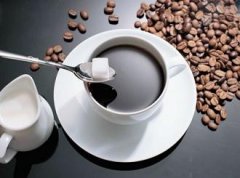Ten facts of coffee: anti-cancer and anti-aging is better than wine

Coffee has always been said differently, and many people are biased against it. This article will give you a new perspective on coffee.
According to the Russian newspaper Pravda, the latest research confirms that coffee is good for health, can prevent cancer and delay aging, but drinking too much can also cause harm to health, so it is important to grasp the good degree. Here are 10 facts about coffee that are good for you and your understanding of coffee.
Fact 1: Coffee is good for you
Coffee has both advantages and disadvantages, so moderate consumption is key to benefiting, doctors say. Drinking two to three cups of coffee a day is more than enough to protect your heart, increase metabolism and even reduce your appetite if you are overweight, according to research conducted by American biologists. Coffee contains the same amount of antioxidants as green tea, which means it could theoretically prevent cancer and slow aging.
Fact 2: Coffee will kill you
Some experts say coffee should not be drunk because it can raise blood pressure and constrict blood vessel walls, so drinking too much coffee may cause heart disease.
There is some truth to this argument. However, experts in the United States believe that the lethal dose of caffeine is 10 to 13 grams, which means that you have to drink 23 liters of coffee at a time to be fatal, which is equivalent to more than 100 cups of coffee. However, drinking so much liquid at once, even if there is no caffeine, you will not be able to keep your life.
Fact 3: Coffee is a good friend of fitness
Two cups of coffee a day can help relieve muscle soreness after strenuous exercise, say scientists at the University of Georgia. You don't have to drink coffee regularly, just drink two cups after exercise and you'll recover your muscles.
Another advantage of coffee is that it boosts your energy, which helps you exercise longer and better. Caffeine is essential for group sports because it enhances concentration and reflexes. Drinking too much coffee, coupled with intense exercise, can lead to tachycardia and excitement, causing insomnia, nervous disorders and other symptoms.
Fact 4: Coffee is better than wine
Red wine and champagne are considered traditional drinks essential for romantic dinners. Now, however, men are rediscovering this tradition. Researchers at the University of South Wales suggest that if you want to engage passionately with women after dinner, give your woman some coffee.
In a series of experiments with female mice, they found that a certain dose of caffeine caused the mice to have more frequent sexual contact. But perhaps the drink only works for women who don't drink coffee regularly. If she drinks coffee regularly, you'll have to rely on wine and your charisma to turn her on.
There is a theory that a certain dose of caffeine will make men more active in bed. Caffeine increases blood flow, which means more blood is delivered to the sex organs, which may prolong erections and sex. Therefore, coffee can be used as a substance to prevent erectile dysfunction.
Fact 5: Coffee doesn't have much more caffeine than green tea
There are many things to say about coffee, both positive and negative. The claims that coffee helps erections and can cause insomnia are entirely true. Its main effect on the body is to stimulate the nervous system.
A cup of instant coffee usually contains as much caffeine (or slightly more) as a cup of strong black tea. Green tea may contain more caffeine. However, people began to carefully limit coffee consumption in the afternoon, but did not limit tea consumption, knowing that by drinking tea, they would consume more caffeine.
Doctors advise people not to drink coffee for six hours before going to bed. The same should be true of tea, the caffeine contained in tea has a milder and longer lasting effect.
Fact 6: Decaffeinated coffee contains caffeine
If your coffee can says decaf, don't assume you're drinking colored water. Decaffeinated coffee isn't caffeine-free, it's just a little lower, five times less caffeine than regular instant coffee and three times less caffeine than cola.
Fact 7: Decaffeinated coffee contains chemicals
Decaffeination involves blanching the beans with hot water to "float" the caffeine particles to the surface, then processing the beans with the organic solvent methylene chloride to roast and treat them. Scientists hope that this globally adopted coffee processing method will produce products that are harmless to humans.
Fact 8: Roasting and brewing methods determine coffee flavor
The essential oils contained in coffee beans evaporate at temperatures of 200 degrees Celsius. The more essential oils extracted during roasting, the more bitter the coffee taste and the stronger the coffee aroma. The color of the coffee beans can tell what roasting method they have been processed by. Green coffee beans are whitish and even slightly bluish in color, and by roasting, the color becomes darker, brown to black. The length of brewing time also affects the taste and composition of coffee. If you want to extract all the caffeine, brew as long as possible and choose a darker roast.
Fact 9: Caffeine is not bitter
The bitter taste of coffee is not caused by caffeine. Chemists believe coffee contains healthy antioxidants that give it a bitter taste. If you want to be young and healthy, try to put up with the bitter taste of coffee.
Fact 10: Goats discover coffee
According to legend, coffee was first discovered and processed in Africa around 800 AD. Kadi, an Ethiopian shepherd, was puzzled why his goats were suddenly in high spirits and kept him awake at night. He decided to find out. He discovered that goats ate red berries grown on trees and became energized. He took the berries to a local priest, who processed the first coffee, and after drinking it, they chanted all night and stopped sleeping.
Important Notice :
前街咖啡 FrontStreet Coffee has moved to new addredd:
FrontStreet Coffee Address: 315,Donghua East Road,GuangZhou
Tel:020 38364473
- Prev

Us studies show that drinking coffee can reduce the risk of head and neck cancer
Los ANGELES, June 22 (Xinhua plateau) A new study in the United States shows that drinking coffee regularly can reduce the risk of head and neck cancer. Head and neck cancer includes oral cancer, nasal cancer, paranasal sinus cancer, salivary adenocarcinoma and lymphatic carcinoma. Researchers at the University of Utah report in the latest issue of Cancer Epidemiology, Biomarkers and Prevention that they are concerned about the international epidemic of head and neck cancer.
- Next

Drinking the right coffee can help you reduce fat and drain swelling.
Coffee has become a daily drink. Many people refresh themselves with a cup of coffee at work. And many studies have shown that coffee is effective against cardiovascular diseases.
Related
- Beginners will see the "Coffee pull flower" guide!
- What is the difference between ice blog purified milk and ordinary milk coffee?
- Why is the Philippines the largest producer of crops in Liberia?
- For coffee extraction, should the fine powder be retained?
- How does extracted espresso fill pressed powder? How much strength does it take to press the powder?
- How to make jasmine cold extract coffee? Is the jasmine + latte good?
- Will this little toy really make the coffee taste better? How does Lily Drip affect coffee extraction?
- Will the action of slapping the filter cup also affect coffee extraction?
- What's the difference between powder-to-water ratio and powder-to-liquid ratio?
- What is the Ethiopian local species? What does it have to do with Heirloom native species?

